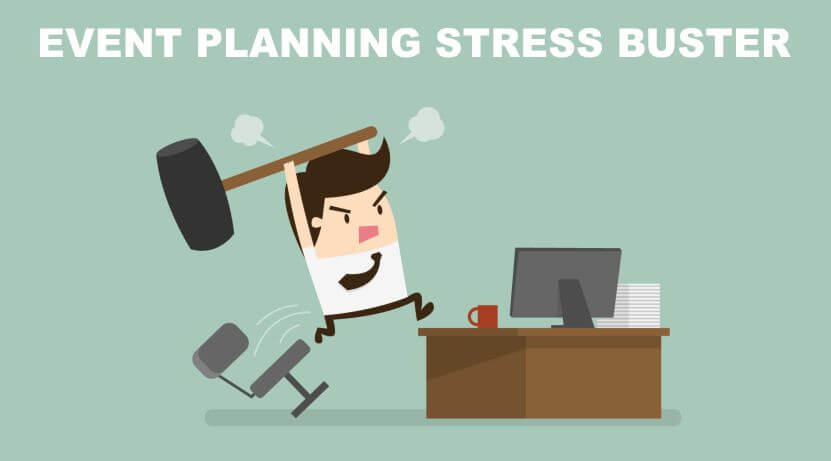
Event Planning Stress Buster
Event planning is stressful. With budget cuts and pressure to meet deadlines and prove ROI, event planner’s job has been listed in the top 10 most stressful jobs list. Coordinating and planning events can take a toll on you if you are not doing it with the right set of tools, tricks, techniques, and resources. Event planners should understand that stress management is equally important as planning events. Here are some of the tools you can use to be more efficient all while getting the relief you deserve. Before we dive deep into stress buster techniques, let’s accept that event planning is a taxing job that does not offer fancy pay package like those of Military General or a Police Officer. So how do you stay motivated, don’t burn out and deliver flawless events? The first tip that comes to my mind is by using technology:
Use technology, but don’t be dependent on it
Event planning can be simplified using technology. But take this advice with a pinch of salt. Unless you absolutely have to use it for solving major roadblocks, I would recommend that you refrain from event technology. For instance, using online event registration or mobile apps at events is no brainer. Collecting payment through bank drafts and registrations by fax can be stressful and time consuming. In this case, using technology can actually help you become more efficient. In contrast, you create a Twitter account for your event when your audience is not even using it. In this scenario, you are subconsciously being used by technology. You are just being carried away by a handful of people who have created “FOMO” and don’t really care if it will be beneficial for your event or not. Embracing such technology without proper validation can give a lot of unnecessary stress.
Walk before you run: break down tasks and pen them down
One of the most effective practices in event planning is breaking down event planning tasks. Taking baby steps can help you alleviate stress. If you try to imagine all the tasks needed to make your event happen and write them down, your stress levels will go down. Why? It’s because thinking of an entire event can take a toll on you. A lot of people will look to you for decision making if you do all the work yourself. Instead, write down the tasks and allocate and prioritize them accordingly.
Strategize your tasks and to-do list
Once you’ve listed your tasks, it’s time to create a strategy around it. A strategy can be as simple as a task roadmap. Creating deadlines for yourself can actually be a stress buster since you’ll be clear about what you need to do and how you’ll do it. Working without an approach can result in bad performance and a lot unwanted stress.
Refrain from Multitasking
Event planners are known for multitasking at work. However, it can prove to be detrimental, reduce your productivity and cause stress. For example, if you answer an email while watch television, you are not doing justice to your tasks and your health. I feel it is fine to multitask during events, but doing it during planning stage is definitely not a good idea.
Live a healthy lifestyle
Your health is directly correlated to your stress levels. As event professionals, we are busy serving attendees and often forget about ourselves. Science says that living a healthy lifestyle by exercising, eating healthy, avoiding stimulants such as alcohol can reduce stress levels. A healthy lifestyle can help us reduce stress and feel less exhausted.
Accept Murphy’s law and deal with it
Event planners are often Nano managers, if not control freaks. You want everything to unfold exactly the way you want. But the reality is that most of the times, things don’t go as planned. You need to accept that there will be some last-minute problems and the only thing you can do is deal with it calmly. Even if there is a small glitch, smart event professionals embrace the problem at hand and work for a solution in an unperturbed manner. For the inexperienced event person, it is normal to freak out when things don’t go as planned.
The right way to deal with last minute problem is to have a backup plan. It will help you avoid major fall backs and reduce your stress level. The way to become stronger is to embrace failure, understand its consequences and see what you can do to avoid it in future. Sometimes, things won’t be in your hand, but never ever blame yourself for things taking a detour.
Final thoughts
In addition to proving ROI, executing flawless events and engaging attendees onsite, taking care of yourself and living a healthy life should also be your goal as an event planner. You should never put yourself second. If you take stress, your attendees will notice it and things can go from bad to worse. Use help in the form of technology or your team members, to make things easier and healthier.
Stay healthy, stay wise!
